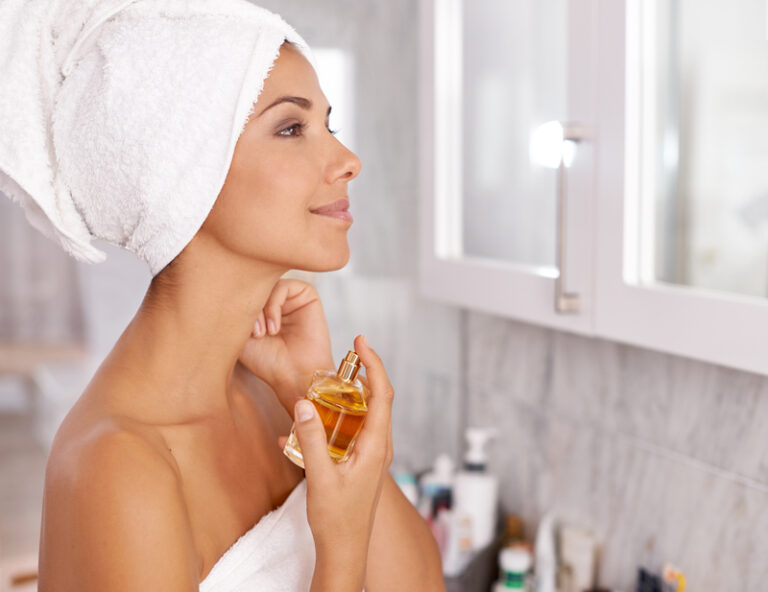Part I
We all want to smell clean and look nice, especially when dressed for a special occasion. However, the fragrances we choose could be hazardous to our health! What?! On a regular basis, we don fragrances in many ways: perfumes, lotions, shampoos, body washes, etc. These are just a few. But, these add up. Accumulative toxins from fragrances could be a key, or at least a puzzle piece, to some of your health issues. Chemical sensitivities in general, are a growing concern, but sometimes what we put on our bodies are the first, most direct source of allergies or sensitivities that we become aware of (think how you feel going through the perfume section of a department store, or walking down the cleaning aisle or pest control isle of a grocery store or hardware store).
Fragrance intolerance or allergy can cause a range of symptoms, which can vary in severity depending on the individual’s sensitivity and the type of exposure. Some of the common symptoms include skin disorders (contact dermatitis, eczema, blisters, burning or stinging sensation, rash or hives), respiratory symptoms (sneezing, runny or stuffy nose, coughing, wheezing, or inability to pull in a deep breath), eye symptoms (redness and irritation, watery eyes, itchiness or swelling), headaches, migraines, dizziness, nausea, fatigue or brain fog. There are other symptoms as well, but these are the most common.
So, what are the hazards of fragrances? In addition to the symptoms above, endocrine disruption, neurotoxicity,
reproductive toxicity, cancer risk, phototoxicity, immune system impairment, toxic build-up and exacerbation of hormone-sensitive conditions such as endometriosis, and hormone-sensitive cancers (i.e. breast cancer).
Endocrine disruption is a serious matter. Endocrine disruptors, also known as hormone disruptors, are chemicals that can interfere with the body’s endocrine system, which is responsible for producing and regulating hormones. Hormones are like messengers that travel through your bloodstream, helping to control vital processes such as growth, metabolism, reproduction, and mood.
When hormone disruptors enter the body, they can mimic, block, or alter the normal functioning of hormones, leading to a variety of health problems. These can include developmental issues, reproductive disorders, thyroid problems, and an increased risk of certain cancers.
The concern with hormone disruptors is that even small amounts can have significant effects, especially during critical periods of development, such as pregnancy and childhood. That’s why many experts advise being cautious with products that may contain these chemicals and opting for safer, natural alternatives when possible. In Part II we will discuss more about these disruptors, and also how these chemicals affect our brain and reproductive systems, and what we can do to protect ourselves and others. Since so many people are sensitive to chemicals, out of respect for them, if not for ourselves, I advise people to reduce as much as possible the chemicals they wear on their bodies.
Part II
In Part I of Fragrance Hazards: More Than Skin Deep, we talked about how we all want to smell clean and look nice, especially when dressed for a special occasion. However, the fragrances we choose could be hazardous to our health! On a regular basis, we don fragrances in many ways: perfumes and colognes, lotions and moisturizers, shampoos and crème rinses, body washes and soaps, after-shower spritzers, deodorants and antiperspirants, toothpaste, hairsprays and other hair styling products, sunscreens, lipsticks and lip glosses, makeup removers, facial cleansers and toners, bath bombs and bath salts, aftershaves and beard oils, face masks and anti-aging elixirs, baby products, toenail and foot fungus oils and powders, vaginal washes or powders and even room deodorizers that are sprayed in a room and especially if sprayed overhead. These are just ones we don on our bodies, not others in our environment!
We have a no-perfume policy in our office because of the growing number of people who come in our doors with chemical sensitivities. But, in addition to the above body-stuff, on our clothes we have laundry soaps, clothes softeners (dryer sheets are some of the worst!), fire retardants, room sprays and even air fresheners/diffusers, and scented candles, all of which have chemicals that cling to our clothing and hair. These add up. Accumulative toxins from fragrances could be a key, or at least a puzzle piece, to some of your health issues.
In Part I we discussed hormone disruptors caused by these chemicals. Many fragrances also cause neuro-toxicity. These can cause a disruption of neurotransmitter function (chemicals responsible for mood regulation, cognition, and behavior), can cause oxidative stress and inflammation which can damage neurons leading to neurodegenerative diseases such as Alzheimer’s and Parkinson’s, cause developmental neurotoxicity affecting brain development in fetuses and young children, leading to developmental delays, learning disabilities and behavioral problems, and contribute to nerve damage and neuropathy that can result in pain, tingling or loss of function in affected areas.
While I had planned to list the worst chemicals, the list was way too long and I’d rather discuss what we can do about it.
First, avoid as many of these things as you can. My favorite website is www.ewg.org. On this website, you can put your favorite products in the search box, and it will give a grade as to its toxicity and even tell you which chemicals are the problem and why. You can also use it to find safe alternatives. In the search box, simply write what you are looking for, for example, “skin moisturizer”, and it will list the products that are “EWG Verified”, meaning low risk of toxicity. That part is really cool!
Doing detox programs and acupuncture to restore endocrine balance and encourage further detox is another thing you can do to help reverse the impact of an accumulation of chemicals in your body over time. Take action now to protect yourself and loved ones from this accumulative problem!
Want to hear more from Dr. Carling? Check out our podcast. Search for VitalHealth4You on your favorite podcast listening app or go to vitalhealthcda.com/podcasts/
©2024 Holly A. Carling, O.M.D., L.Ac., Ph.D.







